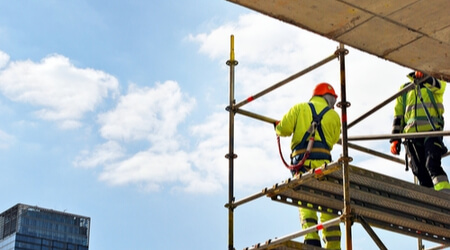
Construction workers need more than a strong back and skill with a hammer to get the job done. Like most modern industries, construction relies on heavy equipment. Power tools, forklifts, excavators and other pieces of machinery enable maximum productivity but the very power that makes equipment so effective also increases the likelihood of danger.
If not responsibly operated and maintained, the tools of the construction trade can cause serious workplace injuries.
Heavy equipment alone doesn’t make a construction site dangerous. Workers in the building trades are exposed to dangers such as heights and falling objects that require the use of personal safety gear. Improperly maintained safety equipment, however, could fail at the very moment a worker needs it.
Scaffolds, ladders, trench supports and other structures are important for worker safety, but can also be prone to fail if not properly built and maintained. Improperly maintained construction equipment can cause an accident.
Your rights as a construction worker include the right to a safe workplace. Your employer has a responsibility to ensure that your workplace is safe. Others – including subcontractors, general contractors, vendors and equipment manufacturers and repairers – share in this responsibility. Failure by any one of these parties to properly care for equipment may make them responsible for injuries the defective equipment causes.
Construction accidents are often complex. It’s a good idea to discuss what happened with an experienced South Carolina personal injury attorney. The lawyers at Joye Law Firm have nearly 250 years of combined experience of combined litigation experience.
Find out how we can help you recover compensation for medical bills, lost wages and more. Call Joye Law Firm now or fill out our online contact form for a free claim review.
OSHA Regulations On Construction Equipment Maintenance
The Occupational Safety & Health Administration (OSHA) has numerous regulations that describe how construction equipment should be properly maintained, including the following:
- Personal protective equipment – Protective equipment shall be provided, used and maintained in a sanitary and reliable condition [1926.95(a)].
- Hand and power tools – All hand and power tools and similar equipment shall be maintained in a safe condition [1926.300(a)].
- Scaffolds – Scaffolds and scaffold components shall be inspected for visible defects by a competent person before each work shift, and after any occurrence which could affect a scaffold’s structural integrity [1926.451(f)(3)].
- Rigging equipment – Rigging equipment for material handling shall be inspected prior to use on each shift and as necessary during its use to ensure that it is safe. Defective rigging equipment shall be removed from service [1926.251(a)(1)].
- Ladders – Fixed ladders with structural defects such as broken or missing rungs, cleats or steps shall be withdrawn from service until repaired [1926.1053(b)(17)(i)].
Third-Party and Product Liability Lawsuits Over Construction Site Injuries
No matter how you are injured while working on a South Carolina construction site – even if the accident was your fault – you may be entitled to workers’ compensation benefits. You don’t have to sue your employer or a co-worker to receive these benefits. In fact, the workers’ comp system bars lawsuits against employers and co-workers under most circumstances.
You may, however, file a lawsuit alleging negligence against somebody on the construction site with whom you have no employment relationship. For example, if a general contractor that isn’t your employer was responsible for inspecting scaffolding after a work shift but failed to do so, and the next day the scaffold collapsed and injured you, you may be able to file a third-party lawsuit against that contractor.
A product liability lawsuit is one that is filed against an equipment manufacturer, not a company or individual with direct ties to the construction site. Imagine you are using a power tool that, although properly maintained, has a defective cord design that causes you to be electrocuted. In this scenario, you may have a claim against the tool manufacturer. If the malfunction was the result of an improper repair, you may have a claim against the company responsible for the tool’s maintenance in addition to your workers’ compensation claim.
Explore Your Legal Options With a Construction Accident Attorney in South Carolina
Defective or poorly maintained construction equipment may be the responsibility of one of several parties. Remember that a lawsuit against any of them does not affect your workers’ comp claim. You are perfectly within your rights to claim workers’ comp and pursue a third-party lawsuit.
For a full understanding of your legal rights and options, talk to Joye Law Firm. We’ve been helping injured South Carolinians for more than 40 years and are ready to help you with a free case review.
Call Joye Law Firm now to get started or contact us online.
Sources:
- Occupational Safety & Health Administration – Safety and Health Regulations for Construction



























